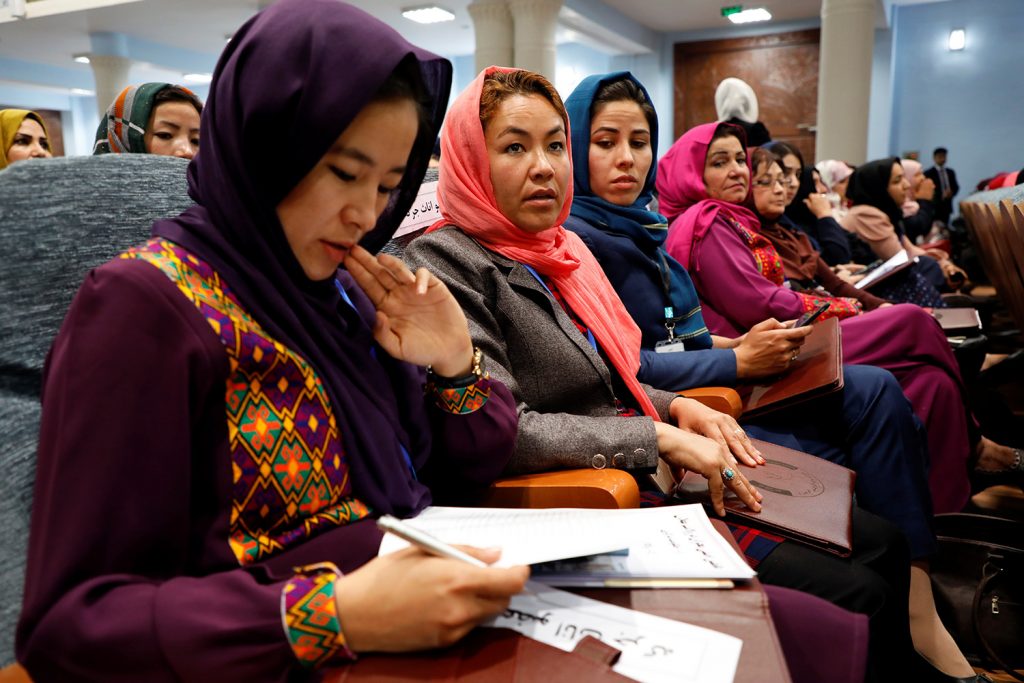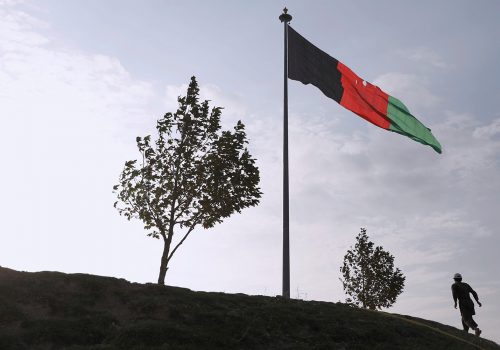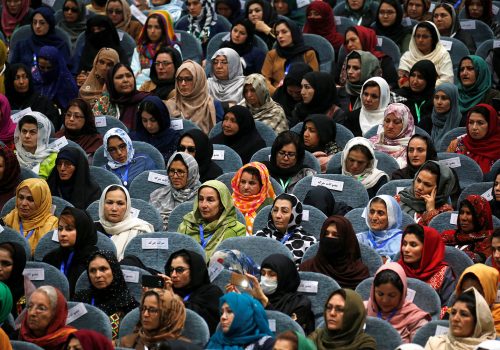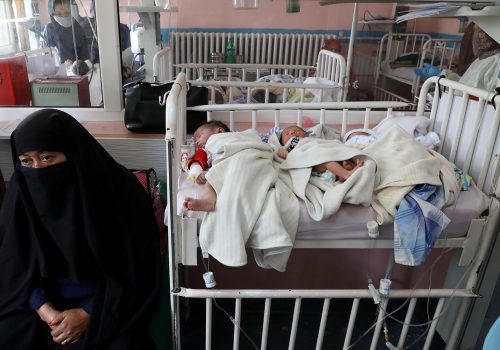As negotiations between the Afghan government and Taliban on a potential peace deal continue in Doha, Qatar, Afghan women are working to ensure that they are not forgotten in any settlement. Once Afghan women “figured out [that] they were being sidelined by the Doha talks,” First Lady of Afghanistan Rula Ghani said on October 28, “they really have made their voices heard and protested very clearly.”
The progress Afghan women have made in the years since the fall of the Taliban regime could be at risk, Ghani continued, should the Taliban be given too much power as part of a peace settlement. “Don’t get me wrong: Afghan women want peace,” she clarified. “We all want peace. Who wouldn’t after living for forty years in such a situation of insecurity and violence at every corner? But we don’t want peace at any cost.”
In addition to Ghani, the Atlantic Council Front Page event also included remarks from former US First Lady Laura Bush, who warned that Afghanistan remains “a very fragile democracy and there are a lot of people—the Taliban obviously—that would rather take over and have [Afghanistan] be like what it was before: a failed country.”
Here’s a quick look at what Ghani and Bush said about the prospect of a settlement with the Taliban, the progress Afghan women have made, and what the future may hold for Afghanistan:
Women are sending a message that there’s no going back
- Women are not the “cost of peace”: As Afghan government and Taliban representatives struggled to agree to terms to start their negotiations this year, many international observers suggested that women would have to “quietly relinquish all the rights you have” in order to achieve peace with the Taliban, sacrificing new-found freedoms as “the cost of peace,” Ghani recalled. These suggestions, she argued, are “why the women [have] stood up so quickly” and pushed for a greater seat at the negotiating table.
- Thinking through the future: Four of the forty-two negotiators representing the Afghan government are women, but Ghani explained that these women “don’t feel…that they are just there for women’s issues; they are national actors.” Importantly, these women have forced negotiators to “think through what life would be like” under a peace agreement, including “how would the Taliban rule over us if there is ever power-sharing.” The women have proven to be “formidable interlocutors to the Taliban” she added, and “have really managed to rise from everyday issues and see the big picture.”
- No new rules for the Taliban: Ghani made clear that the Taliban must be allowed back into Afghan society. “They are our brothers, they are our sisters, and if they are Afghans, they have a right to live in Afghanistan.” But at the same time, she suggested, the Taliban needs “to understand that that if they want to come back and live in Afghanistan, that they have to adhere to the law of the land. They cannot come and impose their own convictions, their own brand of religion on the population.”
- Doubts about Taliban sincerity: An increase in violence by the Taliban since the ceasefire agreement between the United States and the Taliban, signed in February, demonstrates to Ghani that “the Taliban has not changed,” but are rather “still following the same strategy of fear and intimidation.” Ghani worries that the February agreement with Washington still has “several clauses that have not been made public,” and that the uptick in violence casts doubt over whether the Taliban actually wants peace. Bush said she was “not happy about the idea” of the United States “negotiating with the Taliban,” as it risked saying that “they are more important [to the US] than the elected government.”
Watch the full event:
Real progress at risk
- Afghanistan’s untapped potential: Bush worries that the rush to an agreement with the Taliban could mean that Afghan women “lose everything” that they have gained since the Taliban regime fell. “Right after September 11, when the spotlight turned on Afghanistan,” she explained, “what we saw was a failed country and it was failed because half of the population was left out.” She recalled that “women could not leave their home without being fully covered and without a male escort,” a restriction made worse by the number of widows left in a country that had been ravaged by war. But after years of hard work, Afghan women have made “great, great strides,” Bush said, and are now “able to work and contribute to the economy, [and] able to contribute to government.”
- Education as the catalyst: Bush pointed to the growing number of educated Afghan women as an important sign of progress. She noted that more than half of the students at the American University in Kabul are female, including the latest valedictorian. “It shows how hungry Afghan women are to be educated,” she argued. Ghani noted that “we still have a very large proportion of women who cannot read or write,” but “Afghan women are…progressing very, very fast, it is almost exponential.”
- Women are leading: While there are still many illiterate women in Afghanistan, Ghani emphasized that “these women also can think.” When her office visited all thirty-four provinces of Afghanistan to speak with 15,000 women about the peace process, Ghani said that her officials found the women everywhere to be “incredibly sophisticated. They knew not only what was happening around them, but they knew [also] what was happening in the country, in the region, in the world.” Ghani remembered that in 2017 she told the United Nations that women in Afghanistan were finally “visible,” but now, she said, “I can add that they are not only visible but also active and effective.” She noted that in her position she has met many women who are now taking leadership positions at the local and national level “to be real strong actors in the rebuilding of the country.”
A continued role for the world
- Afghanistan still needs support: As the Afghan government attempts to reach an agreement with the Taliban that manages to retain the freedoms won over the last two decades, Bush argued that the United States and other allies “have a moral obligation really to continue to support the people of Afghanistan.” While Bush said she understands the desire for peace and to bring US troops home, a durable peace in Afghanistan “is in our moral interest…and in our security interest,” which requires the United States to “continue to try to send money to Afghanistan for the legitimate government and legitimate projects.” Bush said that she admires “the way the women of Afghanistan have been able to step out and secure their rights and be full contributing members to their economy and their society in every way,” and that these women should know that she and many others in the United States are still “standing with them.”
- Clarity above all else: It is important for all Afghans and the international community to understand that “achieving peace is going to take time, especially building peace,” Ghani said. The international community can help Afghanistan, she added, by providing “clarity.” With competing views on peace and various timelines for withdrawal, Ghani explained, Afghans “hear so many voices with so many different messages—sometimes dissonant messages—and it really is very confusing.” At this crucial time for Afghanistan, a consistent message from international partners can go a long way in supporting Afghanistan’s push for peace.
David A. Wemer is associate director, editorial at the Atlantic Council. Follow him on Twitter @DavidAWemer.
Further reading:

The South Asia Center is the hub for the Atlantic Council’s analysis of the political, social, geographical, and cultural diversity of the region. At the intersection of South Asia and its geopolitics, SAC cultivates dialogue to shape policy and forge ties between the region and the global community.
Image: Afghan women attend a consultative grand assembly, known as Loya Jirga, in Kabul, Afghanistan April 29, 2019. REUTERS/Omar Sobhani



